动词与名词的词性转换GQ
英语单词词性转换的基本规律之欧阳学创编
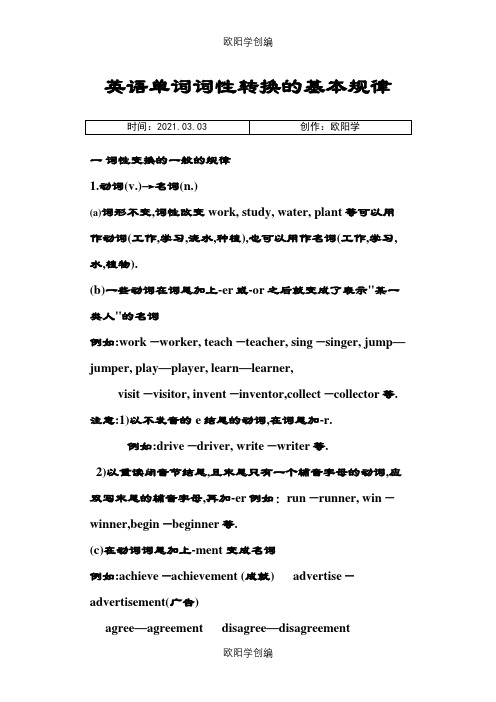
英语单词词性转换的基本规律一词性变换的一般的规律1.动词(v.)→名词(n.)(a)词形不变,词性改变work, study, water, plant等可以用作动词(工作,学习,浇水,种植),也可以用作名词(工作,学习,水,植物).(b)一些动词在词尾加上-er或-or之后就变成了表示"某一类人"的名词例如:work—worker, teach—teacher, sing—singer, jump—jumper, play—player, learn—learner,visit—visitor, invent—inventor,collect—collector等.注意:1)以不发音的e结尾的动词,在词尾加-r.例如:drive—driver, write—writer等.2)以重读闭音节结尾,且末尾只有一个辅音字母的动词,应双写末尾的辅音字母,再加-er例如:run—runner, win—winner,begin—beginner等.(c)在动词词尾加上-ment 变成名词例如:achieve—achievement (成就) advertise—advertisement(广告)agree—agreement disagree—disagreementamuse—amusement (娱乐) improve—improvement(争吵) commit(奉献)—commitment develop—development (发展)depart—department (局,部) govern(统治)—government(政府)manage—management (管理) equip—equipment (装备) 有些单词比较特殊,需把动词后的e去掉再加ment.例如:argue—argument(争论)(d)在动词词尾加上-(t)ion/(s)ion变成名词例如: attract—attraction; instruct—instruction;invent—invention discuss—discussion;express—expressioneducate—education;graduate—graduation;operate—operation (去e再加"ion")compete—competition; organize—organization (把e改成其他字母再加"tion")decide—decision conclude—conclusion (把de改为s再加"ion")describe—description描写,描绘 (这是特例,不规则变化) (e)在动词词尾加上-ance变成名词例如: appear—appearance (外貌;出现)perform—performance (演出)accept—acceptance (接受)(f)在动词词尾加-ing变成名词 (方法与动词变为现在分词的方法相同)例如:meet—meeting build—building wait—waitingbathe—bathing say—saying(谚语) mean—meaningend —ending train —training wash—washing注意:以重读闭音节结尾,且末尾只有一个辅音字母的动词,应双写末尾的辅音字母,再加-ing如:swim—swimming shop—shopping begin—beginning(g)其他一些比较特殊的变化例如: Beg(乞讨)—beggar(乞丐) behave(行为举止)—behaviorknow(知道)—knowledge(知识) fly—flight (飞行) heat (加热)—heat(热量) hit (撞击)—hit( 轰动一时的人或物,碰撞)mix (混合)—mixture(混合物) press(按,压)—pressure(压力)sit(坐)—seat (座位) succeed—success(成功)tour—tour(旅游)/ tourist (游客)2.动词(v.)→形容词(adj.)(a)动词后面加able,以e结尾的动词则去e加able,表示具有此性质,特点或属性.例如: afford-affordable;love-lovable(b)动词后面加ed,以e结尾的动词则直接加d,表示被动性的属性或特点.例如: scatter-scattered use-used(c)不规则的动词则必须记忆,记住其过去分词形式.规律不大,意义同(b).3.名词(n.)→形容词(adj.)(a)在名词后面加-y可以变成形容词(尤其是一些与天气有关的名词)例如: rain—rainy, cloud—cloudy, wind—windy, snow—snowy,health—healthy, luck—lucky,anger—angry guilt—guilty(内疚的)tourist—touristy(游客多的) , salt (盐)—salty (咸的) silk(丝绸)—silky(丝绸般的), sleep—sleepy (昏昏欲睡的)注意:1)如果以重读闭音节结尾,且词尾只有一个辅音字母,这时应双写辅音字母再加"-y". 如: sun—sunny, fun—funny, fog—foggy(有雾的), fur—furry(毛皮的)2)少数以不发音的e结尾的名词变为形容词时,应去掉e 再加"-y".如: noise—noisy, ice—icy, shine—shiny(发亮的),taste(口味)—tasty(甜的)(b)名词后面加-ed,以e结尾的直接加d.例如: spot(斑点)—spotted(有斑点的); talent—talented (有天赋的)organize—organized 有组织的; balance—balanced(平衡的)(c)一些抽象名词在词尾加-ful可以变为形容词例如:care—careful, thank—thankful, help—helpful,use—useful, meaning—meaningful(d)在名词后加-less构成含有否定意义的形容词例如:care—careless(粗心的), use—useless(无用的)hope—hopeless(没希望的),home—homeless(无家可归的)(e)一些以-ce结尾的名词,把-ce改为-t变成形容词例如: difference—different, silence—silent, confidence—confident(f).在名词后加-ly变为形容词例如: friend—friendly, love—lovely, live---lively(g).在名词后加-ous变为形容词例如: danger—dangerous(h)名词后面加-al变为形容词例如: music—musical; medicine—medical (这个比较特殊) (i)名词后面加-able变为形容词,如果以e结尾就去e再加"-able".例如: adjust—adjustable 可调整的 value—valuable有价值的(j)名词后面加-en变成形容词例如: wood—wooden 木制的 wool—woolen 羊毛的(k)一些表示国家的名词可以在词尾加-ese, -ish或-n构成表示国籍,语言的形容词例如:China—Chinese, Japan—Japanese, England—English,America—American, India—Indian, Australia —Australian (注意Canada—Canadian)4.形容词(adj.)→副词(adv.)▲一般在形容词的词尾加-ly可以变成副词例如: quick—quickly, slow—slowly, loud—loudly, sudden —suddenly 等但是,以下几点值得注意:(a) 一些以"辅音字母+y"结尾的形容词,要把y改为i再加-ly例如: happy—happily, angry—angrily, lucky—luckily, heavy—heavily, noisy—noisily(b) 有些以-ble或-le结尾的形容词,去掉e加-y例如:possible—possibly, terrible—terribly(c)少数以e结尾的形容词,要去掉e再加-ly例如: true—truly但绝大多数以e结尾的形容词仍然直接加-ly 例如: polite —politely, wide—widely(d)以-l结尾的形容词变为副词时要在词尾加-ly,以-ll结尾的才在词尾只加-y.例如: usual—usually, careful—carefully, useful—usefully full—fully (以-ll结尾的才只加y)二 . 派生:指由一个词根加上前缀和(或)后缀构成另一个词的构词形式。
英语单词词性转换
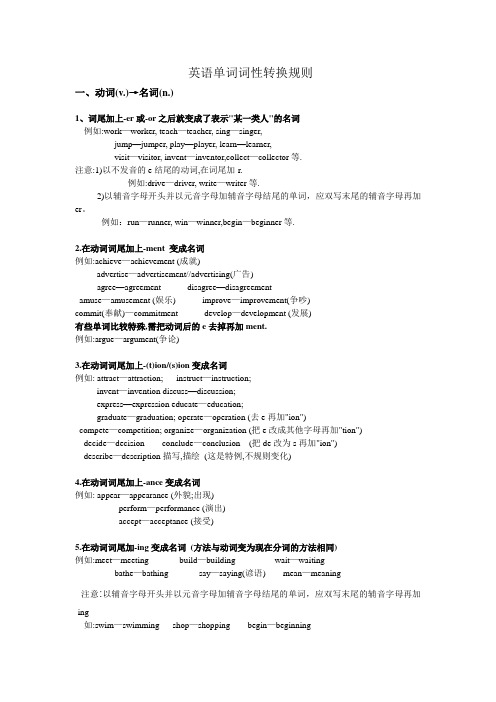
英语单词词性转换规则一、动词(v.)→名词(n.)1、词尾加上-er或-or之后就变成了表示"某一类人"的名词例如:work—worker, teach—teacher, sing—singer,jump—jumper, play—player, learn—learner,visit—visitor, invent—inventor,collect—collector等.注意:1)以不发音的e结尾的动词,在词尾加-r.例如:drive—driver, write—writer等.2)以辅音字母开头并以元音字母加辅音字母结尾的单词,应双写末尾的辅音字母再加er。
例如:run—runner, win—winner,begin—beginner等.2.在动词词尾加上-ment 变成名词例如:achieve—achievement (成就)advertise—advertisement//advertising(广告)agree—agreement disagree—disagreementamuse—amusement (娱乐) improve—improvement(争吵)commit(奉献)—commitment develop—development (发展)有些单词比较特殊,需把动词后的e去掉再加ment.例如:argue—argument(争论)3.在动词词尾加上-(t)ion/(s)ion变成名词例如: attract—attraction; instruct—instruction;invent—invention discuss—discussion;express—expression educate—education;graduate—graduation; operate—operation (去e再加"ion") compete—competition; organize—organization (把e改成其他字母再加"tion") decide—decision conclude—conclusion (把de改为s再加"ion") describe—description描写,描绘(这是特例,不规则变化)4.在动词词尾加上-ance变成名词例如: appear—appearance (外貌;出现)perform—performance (演出)accept—acceptance (接受)5.在动词词尾加-ing变成名词(方法与动词变为现在分词的方法相同)例如:meet—meeting build—building wait—waitingbathe—bathing say—saying(谚语) mean—meaning注意:以辅音字母开头并以元音字母加辅音字母结尾的单词,应双写末尾的辅音字母再加-ing如:swim—swimming shop—shopping begin—beginning6.其他一些比较特殊的变化例如: Beg(乞讨)—beggar(乞丐) behave(行为举止)—behaviorknow(知道)—knowledge(知识) fly—flight (飞行)sit(坐)—seat (座位) succeed—success(成功)tour—tour(旅游)/ tourist (游客)二、动词(v.)→形容词(adj.)1.动词后面加able,以e结尾的动词则去e加able,表示具有此性质,特点或属性.例如: afford-affordable;love-lovable2.动词后面加ed,以e结尾的动词则直接加d,表示被动性的属性或特点.例如: scatter-scattered use-used3不规则的动词则必须记忆,记住其过去分词形式.规律不大,意义同(b).三.名词(n.)→形容词(adj.)1.在名词后面加-y可以变成形容词(尤其是一些与天气有关的名词)例如: rain—rainy, cloud—cloudy, wind—windy, snow—snowy,health—healthy, luck—lucky,anger—angry guilt—guilty(内疚的)tourist—touristy(游客多的) , salt (盐)—salty (咸的)silk(丝绸)—silky(丝绸般的), sleep—sleepy (昏昏欲睡的)注意:1)如果以辅音字母开头并以元音字母加辅音字母结尾,这时应双写辅音字母再加"-y".如: sun—sunny, fun—funny, fog—foggy(有雾的), fur—furry(毛皮的)2)少数以不发音的e结尾的名词变为形容词时,应去掉e再加"-y".如: noise—noisy, ice—icy, shine—shiny(发亮的), taste(口味)—tasty(甜的)2.名词后面加-ed,以e结尾的直接加d.例如: spot(斑点)—spotted(有斑点的); talent—talented (有天赋的)organize—organized 有组织的; balance—balanced(平衡的)3.一些抽象名词在词尾加-ful可以变为形容词例如:care—careful, thank—thankful, help—helpful,use—useful, meaning—meaningful4.在名词后加-less构成含有否定意义的形容词例如:care—careless(粗心的), use—useless(无用的)hope—hopeless(没希望的),home—homeless(无家可归的)5.一些以-ce结尾的名词,把-ce改为-t变成形容词例如: difference—different, silence—silent, confidence—confident6.在名词后加-ly变为形容词例如: friend—friendly, love—lovely, live---lively7.在名词后加-ous变为形容词例如: danger—dangerous8.名词后面加-al变为形容词例如: music—musical; medicine—medical (这个比较特殊)9名词后面加-able变为形容词,如果以e结尾就去e再加"-able".例如: adjust—adjustable 可调整的value—valuable有价值的10.名词后面加-en变成形容词例如: wood—wooden 木制的wool—woolen 羊毛的四.形容词(adj.)→副词(adv.)▲一般在形容词的词尾加-ly可以变成副词例如: quick—quickly, slow—slowly, loud—loudly, sudden—suddenly 等但是,以下几点值得注意:(a) 一些以"辅音字母+y"结尾的形容词,要把y改为i再加-ly例如: happy—happily, angry—angrily, lucky—luckily, heavy—heavily, noisy—noisily(b) 有些以-ble或-le结尾的形容词,去掉e加-y例如:possible—possibly, terrible—terribly(c)少数以e结尾的形容词,要去掉e再加-ly例如: true—truly但绝大多数以e结尾的形容词仍然直接加-ly 例如: polite—politely, wide—widely(d)以-l结尾的形容词变为副词时要在词尾加-ly,以-ll结尾的才在词尾只加-y.例如: usual—usually, careful—carefully, useful—usefullyfull—fully (以-ll结尾的才只加y)。
英语词性转换七大规则

英语词性转换七⼤规则
英语词性转换包括:动词转化为名词;动词转化成名词-形容词;动词转化成形容词,副词,名词;名词转化为形容词;名词转化为名词复数;形容词转化为副词;形容词转化为副词,名词。
英语词性转换七⼤规则及例⼦
(1)动词转化为名词, post-postage mail-mail weigh-weight advise-advice
(2)动词转化成名词-形容词 act-actor / actress-active change-change-changeable
(3)动词转化成形容词,副词,名词 fill-full,need-necessary-necessarily interest(v. / n.) interested /interesting
(4)名词转化为形容词 person personal ( 个⼈的; 私⼈的 ) fun funny
(5)名词转化为名词复数 gentleman gentlemen human humans
(6)形容词转化为副词 possible possibly probable probably
(7)形容词转化为副词,名词 true truly truth lucky luckily luck。
英语词性转换归纳汇总
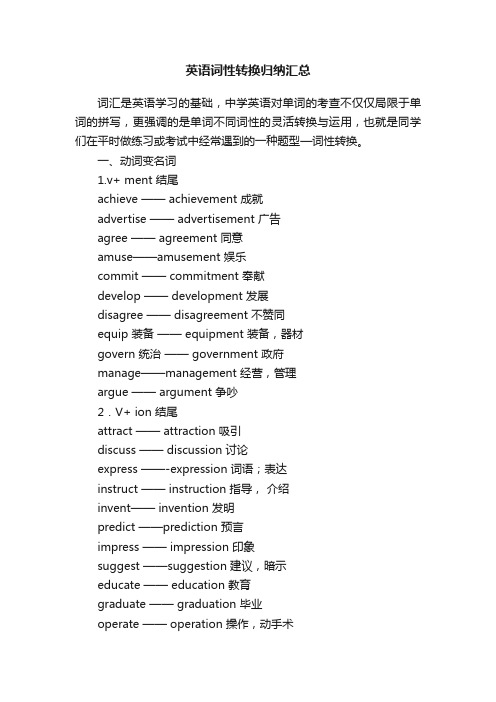
英语词性转换归纳汇总词汇是英语学习的基础,中学英语对单词的考查不仅仅局限于单词的拼写,更强调的是单词不同词性的灵活转换与运用,也就是同学们在平时做练习或考试中经常遇到的一种题型—词性转换。
一、动词变名词1.v+ ment 结尾achieve —— achievement 成就advertise —— advertisement 广告agree —— agreement 同意amuse——amusement 娱乐commit —— commitment 奉献develop —— development 发展disagree —— disagreement 不赞同equip 装备—— equipment 装备,器材govern 统治—— government 政府manage——management 经营,管理argue —— argument 争吵2.V+ ion 结尾attract —— attraction 吸引discuss —— discussion 讨论express ——-expression 词语;表达instruct —— instruction 指导,介绍invent—— invention 发明predict ——prediction 预言impress —— impression 印象suggest ——suggestion 建议,暗示educate —— education 教育graduate —— graduation 毕业operate —— operation 操作,动手术illustrate —— illustration 阐明,举例说明pollute —— pollution 污染introduce ——introduction 介绍organize ——organization组织imagine —— imagination 想象力inspire——inspiration 灵感,鼓舞人心的invite —— invitation 邀请compete —— competition 竞争,比赛pronounce ——pronunciation发音admit —— admission 承认permit —— permission 允许conclude —— conclusion 结论decide —— decision 决定describe —— description描写,描绘resolve —— resolution 决心solve ——solution 解决方法3.V+ ance 结尾allow —— allowance 允许appear —— appearance 外貌,出现perform —— performance 演出exist —— existance 存在4.V+ ing 结尾end —— ending 结尾,结局train ——training训练mean —— meaning 意义say—— saying 谚语remind —— reminding提醒bathe ——bathing沐浴5.词尾加-er或-or后变成表示“某一类人”的名词work——worker 工人teach——teacher老师sing——singer 歌手jump——jumper跳高运动员play——player表演者、运动员learn——learner 学习者visit——visitor访问者invent——inventor发明家6.V+ 其他beg——beggar 乞丐sit——seat 座位believe —— belief 信仰behave —— behavior 行为know—— knowledge 知识fly—— flight 飞行mix —— mixture 混合物press —— pressure 压力serve —— service 服务succeed ——success 成功pursue —— pursuit 追求,从事propose —— proposal 建议withdraw —— withdrawal 取钱;收回;撤退survive —— survival--survivor 幸存者arrive —— arrival到达analyze —— analysis 分析形容词变名词1.词尾ent改为ency或enceefficient有效率的——efficiency 效率patient——patience/impatience 耐性/无耐心dependent——dependence依赖性independent——independency 独立性urgent——urgency 紧急2.ble结尾,ble改为bilitypossible——possibility 可能responsible——responsibility 责任;职责3.其他accurate——accuracy 准确性 prosperous——prosperity 繁荣 true——truth 真相wide——width 宽度long——length 长度high——height 高度二、名词/动词变形容词1.名词+yhonest —— honesty 诚实的guilt 罪恶——guilty 内疚的health——healthy 健康的luck——lucky 幸运的cloud——cloudy 多云的wind—windy 多风的rain——rainy 多雨的snow——snowy 多雪的tourist —— touristy 游客多的 er结尾,改er为ryhunger——hungry 饥饿的anger —— angry 生气的 fog—— foggy 有雾的sun—— sunny 阳关灿烂的fur—— furry 毛皮的 shine——shiny 发亮的taste —— tasty 美味的2. 名词/动词+ ed 以辅音+辅音结尾的单词,直接加edtalent —— talented 有天赋的offend ——offended 生气的crowd ——crowded 拥挤的以元音字母e结尾的单词直接加dbalance —— balanced 平衡的organize——organized 有组织的pollute ——polluted 被污染的please ——pleased 高兴的元音加辅音结尾的单词,词尾辅音双写再加edspot —— spotted 有斑点的 3.名词+ ful/lesscare —— careful/ careless 小心的/ 粗心的help—— helpful / helpless 有帮助的/ 无助的use—— useful/ useless有用的/ 无用的meaning —— meaningful / meaningless有意义的/无意义的colour—— colourful /colourless多彩的/无色的pain 疼痛——painful /painless痛苦的/ 不痛的thank—— thankful / thankless 充满感激的/ 不知感恩的 peace 和平—— peaceful 和平的play游戏—— playful 爱玩耍的home —— homeless 无家可归的 4.名词/动词+ ablechange —— changeable 易变的adjust——adjustable 可调整的comfort——comfortable 舒适的knowledge——knowledgeable 知识渊博的suit ——suitable 合适的动词以辅音加y结尾把y变i 加able ,deny—— deniable 可否认的rely—— reliable 可靠的 5.名词+ ouscourage——courageous 勇敢的danger—— dangerous 危险的以y结尾,改y为i再加ousmystery神秘—— mysterious 神秘的 6.ce 变 tconfidence—— confident 自信的difference——different 不同的dependence —— dependent 依赖他人的independence—— independent 独立的 7.词尾加 aladdition—— additional 附加的,额外的music—— musical 音乐的person——personal (私人的)nation—— national 国家的education——educational有教育意义的tradition—— traditional 传统的origin起源——original 新颖的;独创的以元音字母结尾的单词,去掉词尾元音加alnature——natural 自然的globe—— global 全球的特例:class—— classical 经典的medicine 药——medical 医学的grammar—— grammatical 语法的 8.名词+ lyfriend—— friendly 友好的live——lively 活跃的,有生气的love——lovely 可爱的week——weekly 每周的man——manly 男子气概的;强壮的 9.词尾+ enwood—— wooden 木制的wool—— woolen 羊毛的 10. 表示方位的词East——easternWest——westernSouth——southernNorth——northern 11.四大洲Asia 亚洲—— AsianAfrica 非洲——AfricanEurope欧洲—— EuropeanAmerica 美洲——American 12. 其他energy精力——energetic 精力充沛的strategy——strategic 战略的scientist——scientific 科学的 fool 傻子——foolish 愚蠢的love——loving 慈爱的pleasure——pleasant 令人愉快的 / pleased高兴的pride——proud 自豪的三、形容词变动词1.词尾加izemodern——modernize 使...现代化social——socialize 使...社会化2.词尾加enfast——fasten 使固定;集中于short—— shorten 缩短wide——widen 放宽less——lessen 使...减少特例(有变形):long——lengthen 使延长strong ——strengthen 加强;巩固3.词前加enlarge —— enlarge 扩大;放大四、形容词变副词1.形容词+ lybad——badly 坏地bright——brightly 明亮地casual——casually 随意地clear——clearly 清楚地complete——completely 完全correct——correctly 正确地final——finally 最后fortunate——fortunately幸运地general——generally 一般来讲loud——loudly 大声地particular ——particularly特别地polite——politely 礼貌地proper ——properly适当地main——mainly 主要地most ——mostly 多半,大多数normal——normally 正常地quick——quickly 迅速地quiet——quietly 轻轻地,安静地real——really 真正地recent ——recently 最近;近来sad——sadly 悲哀地slow——slowly 缓慢地special——specially 专门,特殊地specific——specifically 特定地,明确地strong——strongly 坚决地,强烈地sudden——suddenly突然usual——usually 通常 2. 以le 结尾的,去e + ycomfortable——comfortably 舒服地gentle——gently 温柔地possible——possibly 可能地simple——simply 仅仅;只;简单地terrible——terribly 非常;极度地 3. 辅音字母+ y 变y 为 ilyeasy——easily 容易地heavy——heavily 沉重地happy——happily 快乐地 4.特殊good——well好地true——truly 真实地。
英语单词词性转换的基本规律之欧阳语创编

英语单词词性转换的基本规律一词性变换的一般的规律1.动词(v.)→名词(n.)(a)词形不变,词性改变work, study, water, plant等可以用作动词(工作,学习,浇水,种植),也可以用作名词(工作,学习,水,植物).(b)一些动词在词尾加上-er或-or之后就变成了表示"某一类人"的名词例如:work—worker, teach—teacher, sing—singer, jump—jumper, play—player, learn—learner,visit—visitor, invent—inventor,collect—collector等.注意:1)以不发音的e结尾的动词,在词尾加-r.例如:drive—driver, write—writer等.2)以重读闭音节结尾,且末尾只有一个辅音字母的动词,应双写末尾的辅音字母,再加-er例如:run—runner, win—winner,begin—beginner等.(c)在动词词尾加上-ment 变成名词例如:achieve—achievement (成就) advertise—advertisement(广告)agree—agreement disagree—disagreement amuse—amusement (娱乐) improve—improvement(争吵)commit(奉献)—commitment develop—development (发展)depart—department (局,部) govern(统治)—government(政府)manage—management (管理) equip—equipment (装备)有些单词比较特殊,需把动词后的e去掉再加ment.例如:argue—argument(争论)(d)在动词词尾加上-(t)ion/(s)ion变成名词例如: attract—attraction; instruct—instruction;invent—invention discuss—discussion;express—expressioneducate—education;graduate—graduation;operate—operation (去e再加"ion")compete—competition; organize—organization (把e改成其他字母再加"tion")decide—decision conclude—conclusion (把de改为s再加"ion")describe—description描写,描绘 (这是特例,不规则变化)(e)在动词词尾加上-ance变成名词例如: appear—appearance (外貌;出现)perform—performance (演出)accept—acceptance (接受)(f)在动词词尾加-ing变成名词 (方法与动词变为现在分词的方法相同)例如:meet—meeting build—building wait—waitingbathe—bathing say—saying(谚语) mean —meaningend —ending train —training wash—washing注意:以重读闭音节结尾,且末尾只有一个辅音字母的动词,应双写末尾的辅音字母,再加-ing如:swim—swimming shop—shopping begin—beginning(g)其他一些比较特殊的变化例如: Beg(乞讨)—beggar(乞丐) behave(行为举止)—behaviorknow(知道)—knowledge(知识) fly—flight (飞行)heat (加热)—heat(热量) hit (撞击)—hit( 轰动一时的人或物,碰撞)mix (混合)—mixture(混合物) press(按,压)—pressure(压力)sit(坐)—seat (座位) succeed—success(成功)tour—tour(旅游)/ tourist (游客)2.动词(v.)→形容词(adj.)(a)动词后面加able,以e结尾的动词则去e加able,表示具有此性质,特点或属性.例如: afford-affordable;love-lovable(b)动词后面加ed,以e结尾的动词则直接加d,表示被动性的属性或特点.例如: scatter-scattered use-used(c)不规则的动词则必须记忆,记住其过去分词形式.规律不大,意义同(b).3.名词(n.)→形容词(adj.)(a)在名词后面加-y可以变成形容词(尤其是一些与天气有关的名词)例如: rain—rainy, cloud—cloudy, wind—windy, snow—snowy,health—healthy, luck—lucky,anger—angry guilt—guilty(内疚的)tourist—touristy(游客多的) , salt (盐)—salty (咸的)silk(丝绸)—silky(丝绸般的), sleep—sleepy (昏昏欲睡的)注意:1)如果以重读闭音节结尾,且词尾只有一个辅音字母,这时应双写辅音字母再加"-y". 如: sun—sunny, fun—funny, fog—foggy(有雾的), fur—furry(毛皮的)2)少数以不发音的e结尾的名词变为形容词时,应去掉e再加"-y".如: noise—noisy, ice—icy, shine—shiny(发亮的), taste(口味)—tasty(甜的)(b)名词后面加-ed,以e结尾的直接加d.例如: spot(斑点)—spotted(有斑点的); talent—talented (有天赋的)organize—organized 有组织的; balance—balanced(平衡的)(c)一些抽象名词在词尾加-ful可以变为形容词例如:care—careful, thank—thankful, help—helpful, use—useful, meaning—meaningful(d)在名词后加-less构成含有否定意义的形容词例如:care—careless(粗心的), use—useless(无用的)hope—hopeless(没希望的),home—homeless(无家可归的)(e)一些以-ce结尾的名词,把-ce改为-t变成形容词例如: difference—different, silence—silent, confidence—confident(f).在名词后加-ly变为形容词例如: friend—friendly, love—lovely, live---lively (g).在名词后加-ous变为形容词例如: danger—dangerous(h)名词后面加-al变为形容词例如: music—musical; medicine—medical (这个比较特殊)(i)名词后面加-able变为形容词,如果以e结尾就去e再加"-able".例如: adjust—adjustable 可调整的 value—valuable有价值的(j)名词后面加-en变成形容词例如: wood—wooden 木制的 wool—woolen 羊毛的(k)一些表示国家的名词可以在词尾加-ese, -ish或-n构成表示国籍,语言的形容词例如:China—Chinese, Japan—Japanese, England—English,America—American, India—Indian, Australia —Australian (注意Canada—Canadian)4.形容词(adj.)→副词(adv.)▲一般在形容词的词尾加-ly可以变成副词例如: quick—quickly, slow—slowly, loud—loudly, sudden—suddenly 等但是,以下几点值得注意:(a) 一些以"辅音字母+y"结尾的形容词,要把y改为i再加-ly例如: happy—happily, angry—angrily, lucky—luckily, heavy—heavily, noisy—noisily(b) 有些以-ble或-le结尾的形容词,去掉e加-y例如:possible—possibly, terrible—terribly(c)少数以e结尾的形容词,要去掉e再加-ly例如: true—truly但绝大多数以e结尾的形容词仍然直接加-ly 例如: polite —politely, wide—widely(d)以-l结尾的形容词变为副词时要在词尾加-ly,以-ll结尾的才在词尾只加-y.例如: usual—usually, careful—carefully, useful—usefullyfull—fully (以-ll结尾的才只加y)二 . 派生:指由一个词根加上前缀和(或)后缀构成另一个词的构词形式。
英语词性转换规则大全之欧阳学创编

英语词性转换规则大全(1)v.-n.动词转化为名词,post-postage mail-mailweigh-weight advise-advice(2)v.-n.-a.动词转化成名词-形容词act-actor / actress-activechange-change-changeable(3) v.-a.-ad.-n.动词转化成形容词,副词,名词fill-fullneed-necessary-necessarilyinterest(v. / n.) interested /interesting(4)n. a. n. a.名词转化为形容词person personal ( 个人的; 私人的 )fun funny(5)n. pl. n. pl.名词转化为名词复数gentleman gentlemen human humans(6)a. ad. a. ad.形容词转化为副词possible possibly probable probably(7)a. ad. n.形容词转化为副词,名词true truly truthlucky luckily luck(8)原级比较级最高级far farther / further farthest / furthestlittle less least一、名词变为形容词的方法1. 在名词后面加-y可以变成形容词(尤其是一些与天气有关的名词)。
例如:rain—rainy, cloud—cloudy, wind—windy, snow—snowy, health—healthy, luck—lucky等。
注意:1)如果名词以重读闭音节结尾,且词尾只有一个辅音字母,这时应双写词尾的辅音字母再加-y。
如:sun—sunny, fun—funny等。
2)少数以不发音的e结尾的名词变为形容词时,应去掉e 再加-y。
例如:noise—noisy, ice—icy 等。
2. 一些抽象名词在词尾加-ful可以变为形容词。
词性转换最新版
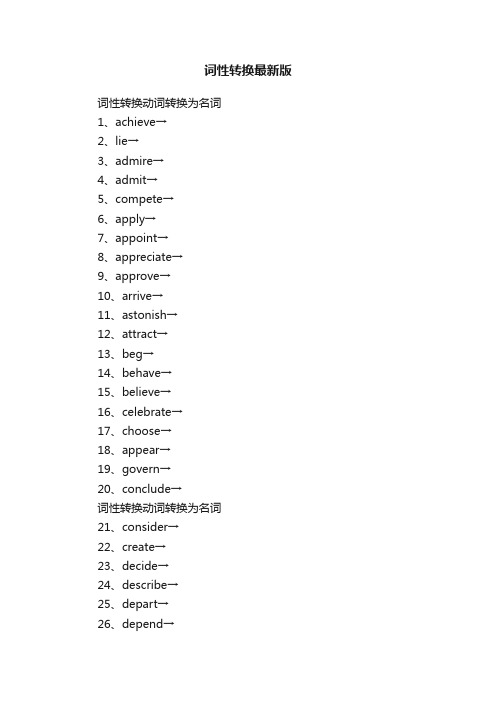
词性转换最新版词性转换动词转换为名词1、achieve→2、lie→3、admire→4、admit→5、compete→6、apply→7、appoint→8、appreciate→9、approve→10、arrive→11、astonish→12、attract→13、beg→14、behave→15、believe→16、celebrate→17、choose→18、appear→19、govern→20、conclude→词性转换动词转换为名词21、consider→22、create→23、decide→24、describe→25、depart→26、depend→28、discuss→29、equip→31、expect→32、explain→33、fail→34、contribute→35、graduate→36、grow→37、hesitate→38、introduce→39、invite→40、judge→词性转换动词转换为名词41、laugh→42、lazy→43、lose→45、mix→46、organize→47、permit→48、perform→49、prepare→50、pronounce→51、prefer→52、please→53、protect→54、pollute→55、propose→56、relax→57、recover→59、refer→60、respond→词性转换动词转换为名词61、Repeat→62、reserve→63、satisfy→64、secure→65、serve→66、starve→67、succeed→68、survive→69、solve→70、tend→71、translate→72、vary→动词/名词转换为形容词1、agriculture→2、admire/admiration→4、ambition→5、effect→6、anxiety→7、accept→8、afford→动词/名词转换为形容词9、age→10、access→11、absence→12、believe→13、benefit→15、change→16、comfort→17、caution→19、convince→20、continue→21、curiosity→22、confidence→23、danger→24、determine→25、devote→26、express→27、forget→28、fog→动词/名词转换为形容词29、fool→30、face→31、gift→32、horror→34、humor→35、honor→36、heat→37、impress→38、invent/invention→39、influence→40、ice→41、imagine→42、knowledge→43、limit→44、luck→45、lose/loss→46、mountain→47、mud→48、memory→动词/名词转换为形容词49、mistake→50、nation→51、music→52、noise→53、nature→54、origin→55、office→56、poison→57、pride→58、physics→59、race→60、responsibility→61、religion→62、rely→63、remain→64、reason→65、sun→66、sleep→67、science→68、spirit→动词/名词转换为形容词69、succeed/success→70、type→71、thirst→72、terror→74、v ary/variety→75、shine→形容词转换为名词1、accurate→3、short→4、weak→5、efficient→6、kind→7、fluent→8、cold→9、private→10、aware→11、free→12、warm→13、bored→形容词转换为名词14、deep→15、wise→16、strong→18、high→19、wide→20、safe→21、cruel→22、disable→形容词转换为副词1、absolutely→2、honestly→3、extremely→4、honorably→6、angrily→7、importantly→8、possibly→9、dryly→10、gently→11、probably→形容词转换为副词12、simply→13、luckily→14、shyly→15、peacefully→16、really→17、successfully→18、terribly→19、horribly→20、happily→21、fully→22、anxiously→23、annually→24、bravely→25、normally→26、largely→27、lazily→28、naturally→29、wisely→30、warmly→31、dully→32、basically→33、scientifically→形容词/副词比较等级拼写1、far→/ →/2、late→/ →/3、good/well→→4、bad(ly)/ill→→(此文档部分内容来源于网络,如有侵权请告知删除,文档可自行编辑修改内容,供参考,感谢您的配合和支持)。
词性转换规律
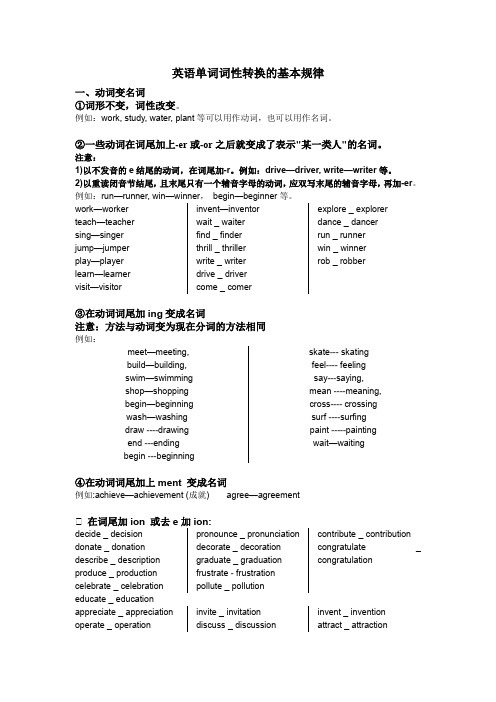
英语单词词性转换的基本规律一、动词变名词①词形不变,词性改变。
例如:work, study, water, plant等可以用作动词,也可以用作名词。
②一些动词在词尾加上-er或-or之后就变成了表示"某一类人"的名词。
注意:1)以不发音的e结尾的动词,在词尾加-r。
例如:drive—driver, write—writer等。
2)以重读闭音节结尾,且末尾只有一个辅音字母的动词,应双写末尾的辅音字母,再加-er。
例如:run—runner, win—winner,begin—beginner等。
work—worker teach—teacher sing—singer jump—jumper play—player learn—learner visit—visitor invent—inventorwait _ waiterfind _ finderthrill _ thrillerwrite _ writerdrive _ drivercome _ comerexplore _ explorerdance _ dancerrun _ runnerwin _ winnerrob _ robber③在动词词尾加ing变成名词注意:方法与动词变为现在分词的方法相同例如:meet—meeting, build—building, swim—swimming shop—shopping begin—beginning wash—washing draw ----drawing end ---ending begin ---beginning skate--- skating feel---- feeling say---saying, mean ----meaning, cross---- crossing surf ----surfing paint -----painting wait—waiting④在动词词尾加上ment 变成名词例如:achieve—achievement (成就) agree—agreement ⑤在词尾加ion 或去e加ion:decide _ decision donate _ donation describe _ description produce _ production celebrate _ celebration pronounce _ pronunciationdecorate _ decorationgraduate _ graduationfrustrate - frustrationpollute _ pollutioncontribute _ contributioncongratulate _congratulationeducate _ educationappreciate _ appreciation operate _ operation invite _ invitationdiscuss _ discussioninvent _ inventionattract _ attraction⑥其他一些比较特殊的变化know ---- knowledge please ---pleasure enjoy--- enjoyment practise--- practice die ---death succeed--- success weigh ---weight sit-- seatchange --chance enter --entrancefly --flightdiscover-- discovery appear-- appearance breathe-- breath二、名词变形容词①在名词后面加-y可以变成形容词(尤其是一些与天气有关的名词)例如: rain—rainy, cloud—cloudy, salt —salty sleep—sleepy注意:1)如果以重读闭音节结尾,且词尾只有一个辅音字母,这时应双写辅音字母再加"-y".如: sun—sunny, fun—funny, fog—foggy2)少数以不发音的e结尾的名词变为形容词时,应去掉e再加"-y".如: noise—noisy, ice—icy②名词后面加-ed,以e结尾的直接加d,表示被动性的属性或特点.talent—talented (有天赋的) use-usedplease - pleasedunite - unitedexcite - excitedclose - closedrelax - relaxed surprise - surprised, develop - developed interest - interested crowd - crowded pollute - polluted③一些抽象名词在词尾加-ful可以变为形容词use - useful care - careful, help - helpful, thank - thankful peace - peaceful, forget - forgetful, play - playful, succeed - successful, wonder - wonderful④在名词后加-less构成含有否定意义的形容词例如:care—careless, use—uselesshope—hopeless,home—homeless⑤一些以-ce结尾的名词,把-ce改为-t变成形容词例如: difference—different, silence—silent, confidence—confident ⑥在名词后加-ly变为形容词例如: friend—friendly, love—lovely, live---lively⑦在名词后加-ous变为形容词例如: danger—dangerous humor—humorous⑧名词后面加-al变为形容词例如: music—musical; medicine—medical (这个比较特殊) educate - educational ⑨名词后面加-able变为形容词,如果以e结尾就去e再加"-able".例如: adjust—adjustable 可调整的value—valuable有价值的know - knowledgeable, enjoy - enjoyabe, suit - suitableadjust - adjustable, comfort - comfortable⑩名词后面加-en变成形容词例如: wood—wooden 木制的wool—woolen 羊毛的speak - spoken, break - broken⑪一些表示国家的名词可以在词尾加-ese, -ish或-n构成表示国籍,语言的形容词例如:China—Chinese, England—English,America—American, Australia —Australian(注意Canada—Canadian)⑫其它:lose - lost,fool - foolish,live - lively / alive /living, sleep - sleepy / sleeping / asleep, wake - awake, taste - tastydie - dead,world - worldwide。
打印 英语单词词性转换的基本规律

打印英语单词词性转换的基本规律----d8025f34-6eb2-11ec-9183-7cb59b590d7d打印-英语单词词性转换的基本规律英语词性转换的基本规则动词(v.)→名词(n.)(a)词形不变,词性改变例如:work、study、water、plant等可以用作动词(work、study、water、plant)或名词(work、study、water、plant)(b)有些动词在词尾加上-er或-or后成为\某类人的名词例如:work―worker,teach―teacher,sing―singer,跳跃——跳投、玩耍——玩家、学习——学习者、参观——访客、发明者、发明者、收藏者、收藏者等注意:1)以不发音的e结尾的动词,在词尾加-r.例如:drive―driver,write―writer 等.2)以重读闭音节结尾,且末尾只有一个辅音字母的动词,应双写末尾的辅音字母,再加-er例如:run―runner,win―winner,begin―beginner等.(c)在动词词尾加上-ment变成名词例如:成就——成就advertise―advertisement//advertising(广告)agree―agreement不同意--不同意--娱乐--改进--改进develop―development(发展)depart―department(局,部)govern(统治)―government(政府)manage―management(管理)equip―equipment(装备)有些词很特别。
你需要去掉动词后的e,并添加例如:argument-argument(d)在动词词尾加上-(t)ion/(s)ion变成名词例如:吸引——吸引;指导——指导;invent―inventiondiscuss―discussion;express―expressioneducate―education;毕业——毕业;操作-操作\decide―decisionconclude―conclusion(把de改为s再加\描述——描述,描述(这是一个特例,不规则的变化)(e)在动词词尾加上-ance变成名词例如:appear―appearance(外貌;出现)perform―performance(演出)accept―acceptance(接受)(f)在动词末尾加-ing使其变成名词(与动词变成现在分词的方式相同)例如:meet―meetingbuild―buildingwait―waitingBath——bathingsay——谚语的意思——意思end―endingtrain―trainingwash―washing注:对于以重读闭合音节结尾且结尾只有一个辅音字母的动词,请在结尾处双写辅音字母并添加-ing如:swim―swimmingshop―shoppingbegin―beginning(g)其他特殊变化例如:beg(乞讨)―beggar(乞丐)behave(行为举止)―behavior知识飞翔飞翔heat(加热)―heat(热量)hit(撞击)―hit(轰动一时的人或物,碰撞)混合-混合压力-压力sit(坐)―seat(座位)succeed―success(成功)旅游-旅游/旅游2.动词(v.)→形容词(adj.)(a)在动词后面加上“能”,在以“e”结尾的动词后面加上“能”,表明它具有这种性质、特征或属性例如:afford-affordable;love-lovable(b)在动词后面加ed,在以E结尾的动词后面直接加D,表示被动的属性或特征例如:scatter-scattereduse-used(c)不规则动词必须记住并记住它们的过去分词形式。
英语词性转换归纳大全
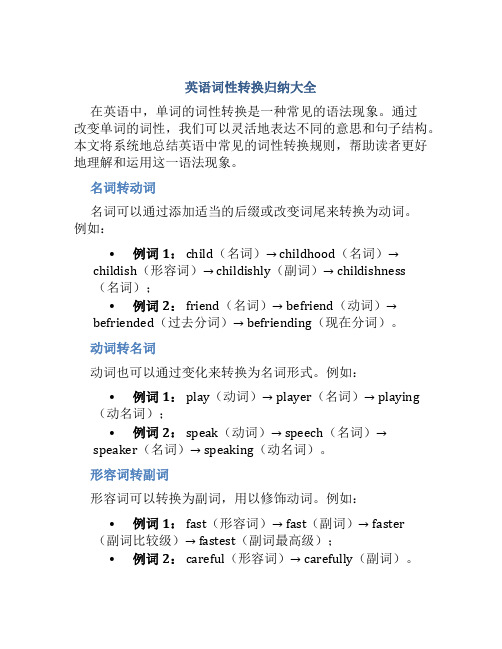
英语词性转换归纳大全在英语中,单词的词性转换是一种常见的语法现象。
通过改变单词的词性,我们可以灵活地表达不同的意思和句子结构。
本文将系统地总结英语中常见的词性转换规则,帮助读者更好地理解和运用这一语法现象。
名词转动词名词可以通过添加适当的后缀或改变词尾来转换为动词。
例如:•例词1: child(名词)→ childhood(名词)→ childish(形容词)→ childishly(副词)→ childishness(名词);•例词2: friend(名词)→ befriend(动词)→ befriended(过去分词)→ befriending(现在分词)。
动词转名词动词也可以通过变化来转换为名词形式。
例如:•例词1: play(动词)→ player(名词)→ playing (动名词);•例词2: speak(动词)→ speech(名词)→ speaker(名词)→ speaking(动名词)。
形容词转副词形容词可以转换为副词,用以修饰动词。
例如:•例词1: fast(形容词)→ fast(副词)→ faster (副词比较级)→ fastest(副词最高级);•例词2: careful(形容词)→ carefully(副词)。
副词转形容词副词可以转换为形容词,用以修饰名词。
例如:•例词1: highly(副词)→ high(形容词)→ highest(最高级形容词);•例词2: beautifully(副词)→ beautiful(形容词)。
名词转形容词名词也可以转换为形容词,用以修饰名词。
例如:•例词1: water(名词)→ watery(形容词)→ wateriest(最高级形容词);•例词2: music(名词)→ musical(形容词)→ musically(副词)。
形容词转名词形容词可以转换为名词,表示具有该特征的事物。
例如:•例词1: poor(形容词)→ the poor(名词,贫穷者);•例词2: young(形容词)→ the young(名词,年轻人)。
英语单词词性转换的基本规律之欧阳道创编

英语单词词性转换的基本规律一词性变换的一般的规律1.动词(v.)→名词(n.)(a)词形不变,词性改变work, study, water, plant等可以用作动词(工作,学习,浇水,种植),也可以用作名词(工作,学习,水,植物).(b)一些动词在词尾加上-er或-or之后就变成了表示"某一类人"的名词例如:work—worker, teach—teacher, sing—singer, jump—jumper, play—player, learn—learner,visit—visitor, invent—inventor,collect—collector 等.注意:1)以不发音的e结尾的动词,在词尾加-r.例如:drive—driver, write—writer等.2)以重读闭音节结尾,且末尾只有一个辅音字母的动词,应双写末尾的辅音字母,再加-er例如:run—runner, win—winner,begin—beginner等.(c)在动词词尾加上-ment 变成名词例如:achieve—achievement (成就) advertise—advertisement(广告)agree—agreement disagree—disagreement amuse—amusement (娱乐) improve—improvement(争吵)commit(奉献)—commitment develop—development (发展)depart—department (局,部) govern(统治)—government(政府)manage—management (管理) equip—equipment (装备)有些单词比较特殊,需把动词后的e去掉再加ment.例如:argue—argument(争论)(d)在动词词尾加上-(t)ion/(s)ion变成名词例如: attract—attraction; instruct—instruction;invent—invention discuss—discussion;express—expressioneducate—education;graduate—graduation;operate—operation (去e 再加"ion")compete—competition; organize—organization (把e改成其他字母再加"tion")decide—decision conclude—conclusion (把de改为s再加"ion")describe—description描写,描绘 (这是特例,不规则变化) (e)在动词词尾加上-ance变成名词例如: appear—appearance (外貌;出现)perform—performance (演出)accept—acceptance (接受)(f)在动词词尾加-ing变成名词 (方法与动词变为现在分词的方法相同)例如:meet—meeting build—building wait—waitingbathe—bathing say—saying(谚语) mean—meaningend —ending train —training wash—washing注意:以重读闭音节结尾,且末尾只有一个辅音字母的动词,应双写末尾的辅音字母,再加-ing如:swim—swimming shop—shopping begin—beginning(g)其他一些比较特殊的变化例如: Beg(乞讨)—beggar(乞丐) behave(行为举止)—behaviorknow(知道)—knowledge(知识) fly—flight (飞行)heat (加热)—heat(热量) hit (撞击)—hit( 轰动一时的人或物,碰撞)mix (混合)—mixture(混合物) press(按,压)—pressure(压力)sit(坐)—seat (座位) succeed—success(成功) tour—tour(旅游)/ tourist (游客)2.动词(v.)→形容词(adj.)(a)动词后面加able,以e结尾的动词则去e加able,表示具有此性质,特点或属性.例如: afford-affordable;love-lovable(b)动词后面加ed,以e结尾的动词则直接加d,表示被动性的属性或特点.例如: scatter-scattered use-used(c)不规则的动词则必须记忆,记住其过去分词形式.规律不大,意义同(b).3.名词(n.)→形容词(adj.)(a)在名词后面加-y可以变成形容词(尤其是一些与天气有关的名词)例如: rain—rainy, cloud—cloudy, wind—windy, snow —snowy,health—healthy, luck—lucky,anger—angry guilt —guilty(内疚的)tourist—touristy(游客多的) , salt (盐)—salty (咸的) silk(丝绸)—silky(丝绸般的), sleep—sleepy (昏昏欲睡的)注意:1)如果以重读闭音节结尾,且词尾只有一个辅音字母,这时应双写辅音字母再加"-y". 如: sun—sunny, fun —funny, fog—foggy(有雾的), fur—furry(毛皮的)2)少数以不发音的e结尾的名词变为形容词时,应去掉e再加"-y".如: noise—noisy, ice—icy, shine—shiny(发亮的), taste(口味)—tasty(甜的)(b)名词后面加-ed,以e结尾的直接加d.例如: spot(斑点)—spotted(有斑点的); talent—talented (有天赋的)organize—organized 有组织的; balance—balanced(平衡的)(c)一些抽象名词在词尾加-ful可以变为形容词例如:care—careful, thank—thankful, help—helpful,use—useful, meaning—meaningful(d)在名词后加-less构成含有否定意义的形容词例如:care—careless(粗心的), use—useless(无用的)hope—hopeless(没希望的),home—homeless(无家可归的)(e)一些以-ce结尾的名词,把-ce改为-t变成形容词例如: difference—different, silence—silent, confidence —confident(f).在名词后加-ly变为形容词例如: friend—friendly, love—lovely, live---lively (g).在名词后加-ous变为形容词例如: danger—dangerous(h)名词后面加-al变为形容词例如: music—musical; medicine—medical (这个比较特殊)(i)名词后面加-able变为形容词,如果以e结尾就去e再加"-able".例如: adjust—adjustable 可调整的 value—valuable有价值的(j)名词后面加-en变成形容词例如: wood—wooden 木制的 wool—woolen 羊毛的(k)一些表示国家的名词可以在词尾加-ese, -ish或-n构成表示国籍,语言的形容词例如:China—Chinese, Japan—Japanese, England—English,America—American, India—Indian, Australia —Australian (注意Canada—Canadian)4.形容词(adj.)→副词(adv.)▲一般在形容词的词尾加-ly可以变成副词例如: quick—quickly, slow—slowly, loud—loudly, sudden—suddenly 等但是,以下几点值得注意:(a) 一些以"辅音字母+y"结尾的形容词,要把y改为i再加-ly例如: happy—happily, angry—angrily, lucky—luckily, heavy—heavily, noisy—noisily(b) 有些以-ble或-le结尾的形容词,去掉e加-y例如:possible—possibly, terrible—terribly(c)少数以e结尾的形容词,要去掉e再加-ly例如: true—truly但绝大多数以e结尾的形容词仍然直接加-ly 例如: polite—politely, wide—widely(d)以-l结尾的形容词变为副词时要在词尾加-ly,以-ll结尾的才在词尾只加-y.例如: usual—usually, careful—carefully, useful—usefullyfull—fully (以-ll结尾的才只加y)二 . 派生:指由一个词根加上前缀和(或)后缀构成另一个词的构词形式。
英语单词词性转换的基本规律之欧阳术创编
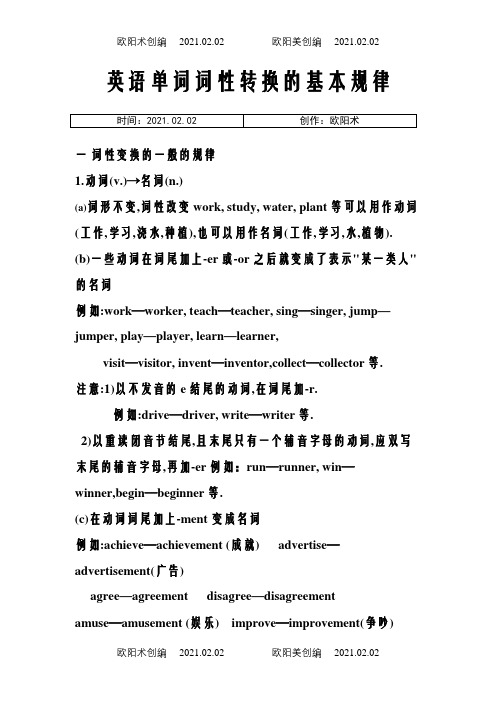
英语单词词性转换的基本规律一词性变换的一般的规律1.动词(v.)→名词(n.)(a)词形不变,词性改变work, study, water, plant等可以用作动词(工作,学习,浇水,种植),也可以用作名词(工作,学习,水,植物). (b)一些动词在词尾加上-er或-or之后就变成了表示"某一类人"的名词例如:work—worker, teach—teacher, sing—singer, jump—jumper, play—player, learn—learner,visit—visitor, invent—inventor,collect—collector等.注意:1)以不发音的e结尾的动词,在词尾加-r.例如:drive—driver, write—writer等.2)以重读闭音节结尾,且末尾只有一个辅音字母的动词,应双写末尾的辅音字母,再加-er例如:run—runner, win—winner,begin—beginner等.(c)在动词词尾加上-ment 变成名词例如:achieve—achievement (成就) advertise—advertisement(广告)agree—agreement disagree—disagreement amuse—amusement (娱乐) improve—improvement(争吵)commit(奉献)—commitment develop—development (发展) depart—department (局,部) govern(统治)—government(政府) manage—management (管理) equip—equipment (装备)有些单词比较特殊,需把动词后的e去掉再加ment.例如:argue—argument(争论)(d)在动词词尾加上-(t)ion/(s)ion变成名词例如: attract—attraction; instruct—instruction;invent—invention discuss—discussion;express—expressioneducate—education;graduate—graduation;operate—operation (去e再加"ion")compete—competition; organize—organization (把e改成其他字母再加"tion")decide—decision conclude—conclusion (把de改为s再加"ion")describe—description描写,描绘 (这是特例,不规则变化)(e)在动词词尾加上-ance变成名词例如: appear—appearance (外貌;出现)perform—performance(演出)accept—acceptance (接受)(f)在动词词尾加-ing变成名词 (方法与动词变为现在分词的方法相同)例如:meet—meeting build—building wait—waitingbathe—bathing say—saying(谚语) mean—meaning end —ending train —training wash—washing 注意:以重读闭音节结尾,且末尾只有一个辅音字母的动词,应双写末尾的辅音字母,再加-ing如:swim—swimming shop—shopping begin—beginning(g)其他一些比较特殊的变化例如: Beg(乞讨)—beggar(乞丐) behave(行为举止)—behaviorknow(知道)—knowledge(知识) fly—flight (飞行)heat (加热)—heat(热量) hit (撞击)—hit( 轰动一时的人或物,碰撞)mix (混合)—mixture(混合物) press(按,压)—pressure(压力)sit(坐)—seat (座位) succeed—success(成功)tour—tour(旅游)/ tourist (游客)2.动词(v.)→形容词(adj.)(a)动词后面加able,以e结尾的动词则去e加able,表示具有此性质,特点或属性.例如: afford-affordable;love-lovable(b)动词后面加ed,以e结尾的动词则直接加d,表示被动性的属性或特点.例如: scatter-scattered use-used(c)不规则的动词则必须记忆,记住其过去分词形式.规律不大,意义同(b).3.名词(n.)→形容词(adj.)(a)在名词后面加-y可以变成形容词(尤其是一些与天气有关的名词)例如: rain—rainy, cloud—cloudy, wind—windy, snow—snowy, health—healthy, luck—lucky,anger—angry guilt—guilty(内疚的)tourist—touristy(游客多的) , salt (盐)—salty (咸的)silk(丝绸)—silky(丝绸般的), sleep—sleepy (昏昏欲睡的)注意:1)如果以重读闭音节结尾,且词尾只有一个辅音字母,这时应双写辅音字母再加"-y". 如: sun—sunny, fun—funny, fog—foggy(有雾的), fur—furry(毛皮的)2)少数以不发音的e结尾的名词变为形容词时,应去掉e再加"-y".如: noise—noisy, ice—icy, shine—shiny(发亮的), taste(口味)—tasty(甜的)(b)名词后面加-ed,以e结尾的直接加d.例如: spot(斑点)—spotted(有斑点的); talent—talented (有天赋的)organize—organized 有组织的; balance—balanced(平衡的) (c)一些抽象名词在词尾加-ful可以变为形容词例如:care—careful, thank—thankful, help—helpful,use—useful, meaning—meaningful(d)在名词后加-less构成含有否定意义的形容词例如:care—careless(粗心的), use—useless(无用的)hope—hopeless(没希望的),home—homeless(无家可归的) (e)一些以-ce结尾的名词,把-ce改为-t变成形容词例如: difference—different, silence—silent, confidence—confident(f).在名词后加-ly变为形容词例如: friend—friendly, love—lovely, live---lively(g).在名词后加-ous变为形容词例如: danger—dangerous(h)名词后面加-al变为形容词例如: music—musical; medicine—medical (这个比较特殊) (i)名词后面加-able变为形容词,如果以e结尾就去e再加"-able".例如: adjust—adjustable 可调整的 value—valuable有价值的(j)名词后面加-en变成形容词例如: wood—wooden 木制的 wool—woolen 羊毛的(k)一些表示国家的名词可以在词尾加-ese, -ish或-n构成表示国籍,语言的形容词例如:China—Chinese, Japan—Japanese, England—English,America—American, India—Indian, Australia —Australian (注意Canada—Canadian)4.形容词(adj.)→副词(adv.)▲一般在形容词的词尾加-ly可以变成副词例如: quick—quickly, slow—slowly, loud—loudly, sudden—suddenly 等但是,以下几点值得注意:(a) 一些以"辅音字母+y"结尾的形容词,要把y改为i再加-ly例如: happy—happily, angry—angrily, lucky—luckily, heavy—heavily, noisy—noisily(b) 有些以-ble或-le结尾的形容词,去掉e加-y例如:possible—possibly, terrible—terribly(c)少数以e结尾的形容词,要去掉e再加-ly例如: true—truly但绝大多数以e结尾的形容词仍然直接加-ly 例如: polite—politely, wide—widely(d)以-l结尾的形容词变为副词时要在词尾加-ly,以-ll结尾的才在词尾只加-y.例如: usual—usually, careful—carefully, useful—usefullyfull—fully (以-ll结尾的才只加y)二 . 派生:指由一个词根加上前缀和(或)后缀构成另一个词的构词形式。
英语词性转换七大规则表
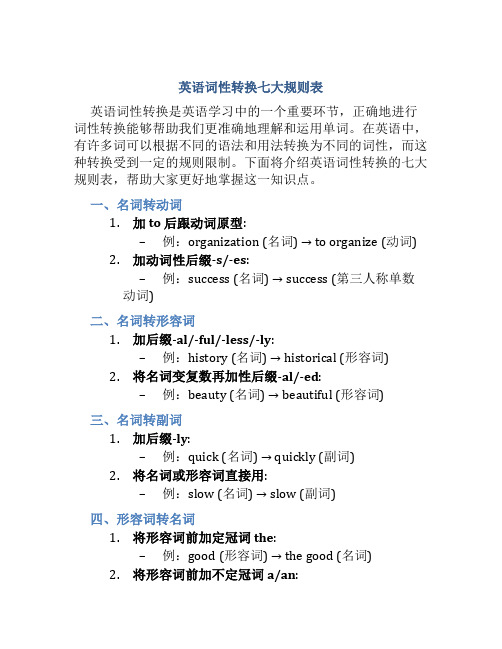
英语词性转换七大规则表英语词性转换是英语学习中的一个重要环节,正确地进行词性转换能够帮助我们更准确地理解和运用单词。
在英语中,有许多词可以根据不同的语法和用法转换为不同的词性,而这种转换受到一定的规则限制。
下面将介绍英语词性转换的七大规则表,帮助大家更好地掌握这一知识点。
一、名词转动词1.加 to 后跟动词原型:–例:organization (名词) → to organize (动词)2.加动词性后缀-s/-es:–例:success (名词) → success (第三人称单数动词)二、名词转形容词1.加后缀-al/-ful/-less/-ly:–例:history (名词) → historical (形容词)2.将名词变复数再加性后缀-al/-ed:–例:beauty (名词) → beautiful (形容词)三、名词转副词1.加后缀-ly:–例:quick (名词) → quickly (副词)2.将名词或形容词直接用:–例:slow (名词) → slow (副词)四、形容词转名词1.将形容词前加定冠词 the:–例:good (形容词) → the good (名词)2.将形容词前加不定冠词 a/an:–例:beautiful (形容词) → a beauty (名词)五、形容词转动词1.将形容词前加连系动词be:–例:easy (形容词) → are easy (动词)2.将形容词前加非谓语动词to:–例:important (形容词) → to important (动词)六、形容词转副词1.加后缀-ly:–例:quick (形容词) → quickly (副词)2.保持原貌:–例:fast (形容词) → fast (副词)七、副词转形容词1.去掉-ly加后缀-al:–例:naturally (副词) → natural (形容词)2.通过加more/less来表示不同级别的比较:–例:softly (副词) → less softly (形容词)以上是英语词性转换的七大规则表,通过掌握这些规则,我们可以更好地理解单词之间的转换关系,从而提升英语学习的效率和准确性。
英语词性转换大全 动词变名词、动词变形容词
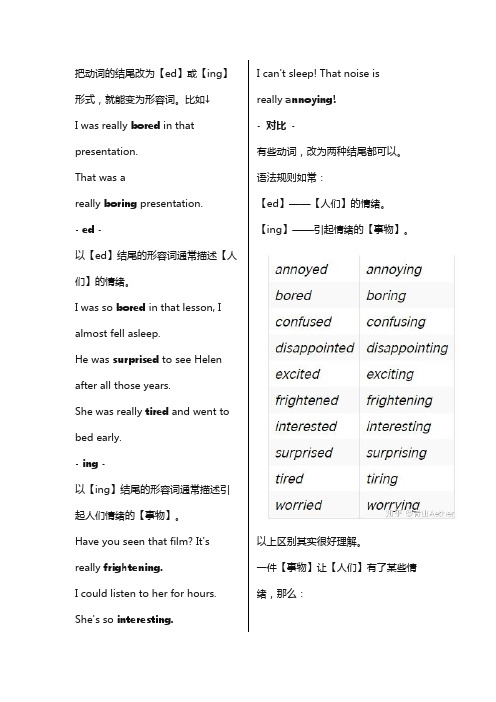
把动词的结尾改为【ed 】或【ing 】形式,就能变为形容词。
比如↓ I was really bored in that presentation. That was areally boring presentation. - ed -以【ed 】结尾的形容词通常描述【人们】的情绪。
I was so bored in that lesson, I almost fell asleep.He was surprised to see Helen after all those years.She was really tired and went tobed early. - ing -以【ing 】结尾的形容词通常描述引起人们情绪的【事物】。
Have you seen that film? It's really frightening.I could listen to her for hours. She's so interesting.I can't sleep! That noise is really annoying! - 对比 -有些动词,改为两种结尾都可以。
语法规则如常:【ed 】——【人们】的情绪。
【ing 】——引起情绪的【事物】。
以上区别其实很好理解。
一件【事物】让【人们】有了某些情绪,那么:【事物】是主动方,用【ing】结尾;【人们】是被动方,用【ed】结尾。
动词变名词1.v+ ment 结尾achieve ——achievement 成就advertise ——advertisement 广告agree ——agreement 同意amuse——amusement 娱乐commit ——commitment 奉献develop ——development 发展disagree ——disagreement 不赞同equip 装备——equipment 装备,器材govern 统治——government 政府manage——management 经营,管理argue ——argument 争吵2.V+ ion 结尾attract ——attraction 吸引discuss ——discussion 讨论express ——-expression 词语;表达instruct ——instruction 指导,介绍invent——invention 发明predict ——prediction 预言impress ——impression 印象suggest ——suggestion 建议,暗示educate ——education 教育graduate ——graduation 毕业operate ——operation 操作,动手术illustrate ——illustration 阐明,举例说明pollute ——pollution 污染introduce ——introduction 介绍organize ——organization组织imagine ——imagination 想象力inspire——inspiration 灵感,鼓舞人心的invite ——invitation 邀请compete ——competition 竞争,比赛pronounce ——pronunciation发音admit ——admission 承认permit ——permission 允许conclude ——conclusion 结论decide ——decision 决定describe ——description描写,描绘resolve ——resolution 决心solve ——solution 解决方法3.V+ ance 结尾allow ——allowance 允许appear ——appearance 外貌,出现perform ——performance 演出exist ——existance 存在4.V+ ing 结尾end ——ending 结尾,结局train ——training训练mean ——meaning 意义say——saying 谚语remind ——reminding提醒bathe ——bathing沐浴5.词尾加-er或-or后变成表示“某一类人”的名词work——worker 工人teach——teacher老师sing——singer 歌手jump——jumper跳高运动员play——player表演者、运动员learn——learner 学习者visit——visitor访问者invent——inventor发明家6.V+ 其他beg——beggar 乞丐sit——seat 座位believe ——belief 信仰behave ——behavior 行为know——knowledge 知识fly——flight 飞行mix ——mixture 混合物press ——pressure 压力serve ——service 服务succeed ——success 成功pursue ——pursuit 追求,从事propose ——proposal 建议withdraw ——withdrawal 取钱;收回;撤退survive ——survival--survivor 幸存者arrive ——arrival到达analyze ——analysis 分析2形容词变名词1.词尾ent改为ency或ence efficient有效率的——efficiency 效率patient——patience/impatience 耐性/无耐心dependent——dependence依赖性independent——independency 独立性urgent——urgency 紧急2.ble结尾,ble改为bility possible——possibility 可能responsible——responsibility 责任;职责3.其他accurate——accuracy 准确性prosperous——prosperity 繁荣true——truth 真相wide——width 宽度long——length 长度high——height 高度二、名词/动词变形容词1.名词+yhonest ——honesty 诚实的guilt 罪恶——guilty 内疚的health——healthy 健康的luck——lucky 幸运的cloud——cloudy 多云的wind—windy 多风的rain——rainy 多雨的snow——snowy 多雪的tourist ——touristy 游客多的er结尾,改er为ry hunger——hungry 饥饿的anger ——angry 生气的fog——foggy 有雾的sun——sunny 阳关灿烂的fur——furry 毛皮的shine——shiny 发亮的taste ——tasty 美味的2. 名词/动词+ ed以辅音+辅音结尾的单词,直接加ed talent ——talented 有天赋的offend ——offended 生气的crowd ——crowded 拥挤的以元音字母e结尾的单词直接加d balance ——balanced 平衡的organize——organized 有组织的pollute ——polluted 被污染的please ——pleased 高兴的元音加辅音结尾的单词,词尾辅音双写再加edspot ——spotted 有斑点的3.名词+ ful/lesscare ——careful/ careless 小心的/ 粗心的help——helpful / helpless 有帮助的/ 无助的use——useful/ useless有用的/ 无用的meaning ——meaningful / meaningless有意义的/无意义的colour——colourful /colourless 多彩的/无色的pain 疼痛——painful /painless痛苦的/ 不痛的thank——thankful / thankless 充满感激的/ 不知感恩的peace 和平——peaceful 和平的play游戏——playful 爱玩耍的home ——homeless 无家可归的4.名词/动词+ ablechange ——changeable 易变的adjust——adjustable 可调整的comfort——comfortable 舒适的knowledge——knowledgeable 知识渊博的suit ——suitable 合适的动词以辅音加y结尾把y变i 加able ,deny——deniable 可否认的rely——reliable 可靠的5.名词+ ous courage——courageous 勇敢的danger——dangerous 危险的以y结尾,改y为i再加ous mystery 神秘——mysterious 神秘的6.ce 变t confidence——confident 自信的difference——different 不同的dependence ——dependent 依赖他人的independence——independent 独立的7.词尾加al addition——additional 附加的,额外的music——musical 音乐的person——personal (私人的) nation——national 国家的education——educational有教育意义的tradition——traditional 传统的origin起源——original 新颖的;独创的以元音字母结尾的单词,去掉词尾元音加alnature——natural 自然的globe——global 全球的特例:class——classical 经典的medicine 药——medical 医学的grammar——grammatical 语法的8.名词+ ly friend——friendly 友好的live——lively 活跃的,有生气的love——lovely 可爱的week——weekly 每周的man——manly 男子气概的;强壮的9.词尾+ en wood——wooden 木制的wool——woolen 羊毛的10. 表示方位的词East——eastern West——western South——southern North——northern11.四大洲Asia 亚洲——AsianAfrica 非洲——African Europe欧洲——European America 美洲——American 12. 其他energy精力——energetic 精力充沛的strategy——strategic 战略的scientist——scientific 科学的fool 傻子——foolish 愚蠢的love——loving 慈爱的pleasure——pleasant令人愉快的/ pleased高兴的pride——proud 自豪的3形容词变动词1.词尾加ize modern——modernize 使...现代化social——socialize 使...社会化2.词尾加enfast——fasten 使固定;集中于short——shorten 缩短wide——widen 放宽less——lessen 使...减少特例(有变形):long——lengthen 使延长strong ——strengthen 加强;巩固3.词前加enlarge ——enlarge 扩大;放大4形容词变副词1.形容词+ ly bad——badly 坏地bright——brightly 明亮地casual——casually 随意地clear——clearly 清楚地complete——completely 完全correct——correctly 正确地final——finally 最后fortunate——fortunately幸运地general——generally 一般来讲loud——loudly 大声地particular ——particularly特别地polite——politely 礼貌地proper ——properly适当地main——mainly 主要地most ——mostly 多半,大多数normal——normally 正常地quick——quickly 迅速地quiet——quietly 轻轻地,安静地real——really 真正地recent ——recently 最近;近来sad——sadly 悲哀地slow——slowly 缓慢地special——specially 专门,特殊地specific——specifically 特定地,明确地strong——strongly 坚决地,强烈地sudden——suddenly突然usual——usually 通常2. 以le 结尾的,去e + y comfortable——comfortably 舒服地gentle——gently 温柔地possible——possibly 可能地simple——simply 仅仅;只;简单地terrible——terribly 非常;极度地3. 辅音字母+ y 变y为ily easy——easily 容易地heavy——heavily 沉重地happy——happily 快乐地4.特殊good——well好地true——truly 真实地。
初中英语词性转换规律总结附学习方法

初中英语词性转换规律总结附学习方法词性转换是英语学习中的重要内容之一,主要是指名词、动词、形容词和副词之间的转换。
以下是初中英语词性转换的常见规律总结:1.名词转动词:可以通过加上动词的前缀或后缀来转换。
- 加前缀:表示开始、做其中一种动作或进行其中一种活动。
例如:end(名词)→extend(动词)- 加后缀:表示把事物加上或变成其中一种状态。
例如:hope(名词)→hopeful(形容词)、lesson(名词)→ lessen(动词)2.动词转名词:可以通过加上名词的后缀来转换。
- 加后缀:表示其中一种行为、状态或事物。
例如:enjoy(动词)→ enjoyment(名词)、read(动词)→ reader(名词)3. 形容词转副词:通常在形容词后加上-ly。
- 加后缀:表示程度或方式。
例如:quick(形容词)→ quickly(副词)、careful(形容词)→ carefully(副词)4. 副词转形容词:在副词前加上very或更高级形容词。
- 加修饰词:表示强调程度。
例如:soon(副词)→very soon(形容词)、good(副词)→better(形容词)学习方法:1.多读多写:通过阅读和写作,积累词汇并学会词性之间的转换。
2.制作词性转换表格:将常见的词性转换规律整理成表格,方便记忆和查找。
3.多做练习:完成词性转换的练习题,提高应用能力。
4.注意词义变化:在词性转换过程中,要注意词义的变化,确保转换后的词语在上下文中使用正确。
总之,词性转换是一个积累和灵活运用的过程,需要多做练习,多积累常见的词性转换规律,以提高自己的语言运用能力。
名词与动词的转换与词性变化
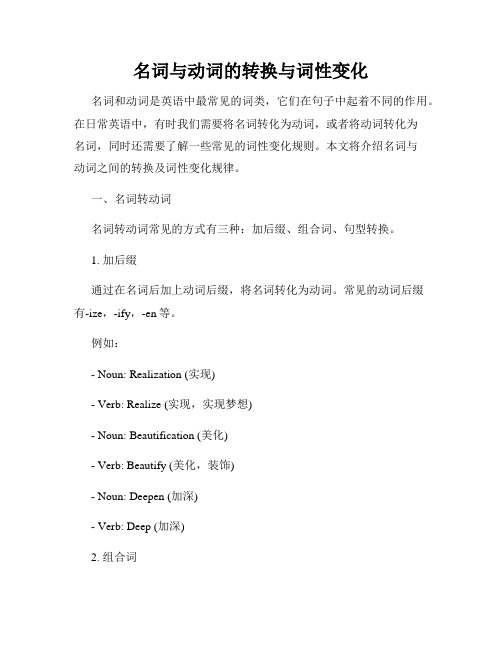
名词与动词的转换与词性变化名词和动词是英语中最常见的词类,它们在句子中起着不同的作用。
在日常英语中,有时我们需要将名词转化为动词,或者将动词转化为名词,同时还需要了解一些常见的词性变化规则。
本文将介绍名词与动词之间的转换及词性变化规律。
一、名词转动词名词转动词常见的方式有三种:加后缀、组合词、句型转换。
1. 加后缀通过在名词后加上动词后缀,将名词转化为动词。
常见的动词后缀有-ize,-ify,-en等。
例如:- Noun: Realization (实现)- Verb: Realize (实现,实现梦想)- Noun: Beautification (美化)- Verb: Beautify (美化,装饰)- Noun: Deepen (加深)- Verb: Deep (加深)2. 组合词将名词与动词组合形成一个新词,表示行为或过程。
例如:- Noun: Sleep (睡眠)- Verb: Sleepwalk (梦游)- Noun: Work (工作)- Verb: Overwork (过度工作)- Noun: Child (孩子)- Verb: Babysit (照顾孩子)3. 句型转换通过将名词放入特定的句型中,转化为动词。
例如:- Noun: Drive (驾驶)- Verb: Take a drive (开车)- Noun: Dance (舞蹈)- Verb: Dance (跳舞)- Noun: Swim (游泳)- Verb: Go for a swim (去游泳)二、动词转名词动词转名词的方式主要有三种:加后缀、动词短语、动名词形式。
1. 加后缀通过在动词后加上名词后缀,将动词转化为名词。
常见的名词后缀有-er,-or,-ing等。
例如:- Verb: Sing (唱歌)- Noun: Singer (歌手)- Verb: Teach (教)- Noun: Teacher (老师)- Verb: Jog (慢跑)- Noun: Jogging (慢跑)2. 动词短语将动词与介词、副词等结合形成一个短语,表示特定的动作或状态。
英语词性转换规则大全知识讲解

英语词性转换规则大全英语词性转换规则大全(1)v.-n.动词转化为名词,post-postage mail-mailweigh-weight advise-advice(2)v.-n.-a.动词转化成名词-形容词act-actor / actress-activechange-change-changeable(3) v.-a.-ad.-n.动词转化成形容词,副词,名词fill-fullneed-necessary-necessarilyinterest(v. / n.) interested /interesting(4)n. a. n. a.名词转化为形容词person personal ( 个人的; 私人的 )fun funny(5)n. pl. n. pl.名词转化为名词复数gentleman gentlemen human humans(6)a. ad. a. ad.形容词转化为副词possible possibly probable probably(7)a. ad. n.形容词转化为副词,名词true truly truthlucky luckily luck(8)原级比较级最高级far farther / further farthest / furthestlittle less least一、名词变为形容词的方法1. 在名词后面加-y可以变成形容词(尤其是一些与天气有关的名词)。
例如:rain—rainy, cloud—cloudy, wind—windy, snow—snowy, health—healthy, luck—lucky等。
注意:1)如果名词以重读闭音节结尾,且词尾只有一个辅音字母,这时应双写词尾的辅音字母再加-y。
如:sun—sunny, fun—funny等。
2)少数以不发音的e结尾的名词变为形容词时,应去掉e再加-y。
例如:noise—noisy, ice—icy 等。
英语词性转换规则大全之欧阳育创编

英语词性转换规则大全(1)v.-n.动词转化为名词,post-postage mail-mailweigh-weight advise-advice(2)v.-n.-a.动词转化成名词-形容词act-actor / actress-activechange-change-changeable(3) v.-a.-ad.-n.动词转化成形容词,副词,名词fill-fullneed-necessary-necessarilyinterest(v. / n.) interested /interesting(4)n. a. n. a.名词转化为形容词person personal ( 个人的; 私人的 )fun funny(5)n. pl. n. pl.名词转化为名词复数gentleman gentlemen human humans(6)a. ad. a. ad.形容词转化为副词possible possibly probable probably(7)a. ad. n.形容词转化为副词,名词true truly truthlucky luckily luck(8)原级比较级最高级far farther / further farthest / furthestlittle less least一、名词变为形容词的方法1. 在名词后面加-y可以变成形容词(尤其是一些与天气有关的名词)。
例如:rain—rainy, cloud—cloudy, wind—windy, snow—snowy, health—healthy, luck—lucky等。
注意:1)如果名词以重读闭音节结尾,且词尾只有一个辅音字母,这时应双写词尾的辅音字母再加-y。
如:sun—sunny, fun—funny等。
2)少数以不发音的e结尾的名词变为形容词时,应去掉e再加-y。
例如:noise—noisy, ice—icy 等。
2. 一些抽象名词在词尾加-ful可以变为形容词。
- 1、下载文档前请自行甄别文档内容的完整性,平台不提供额外的编辑、内容补充、找答案等附加服务。
- 2、"仅部分预览"的文档,不可在线预览部分如存在完整性等问题,可反馈申请退款(可完整预览的文档不适用该条件!)。
- 3、如文档侵犯您的权益,请联系客服反馈,我们会尽快为您处理(人工客服工作时间:9:00-18:30)。
(十)其他变化形式:
analyze /se—analysisapplaud—applause bathe—bath
behave—behaviorbelieve—belief bleed—blood
bury—burialcompare---comparison die—death
employ---employmentencourage---encouragementenjoy---enjoyment
govern---governmentimprove---improvementmanage---management
punish---punishmentrefresh---refreshmentreplace---replacement
reflect---reflectionregulate---regulationreject---rejection
relate---relationrelax---relaxationrepeat---repetition
reserve—reservationsatisfy---satisfactionselect---selection
find---findings(多用pl.:最终发现的东西,调查结果,判决)gather---gathering
greet---greetings(多用复数)hear---hearing(听力,听觉)warn---warning mourn—mourningmisunderstand---misunderstandingopen---opening save(救,节约)---savings(储蓄)say---saying(格言)suffer---suffering
require---requirementretire---retirementsettle---settlement
(二)--tion
adopt—adoptionadapt—adaptation(改编)act—actionadd—additionadmire—admirationviolate---violation
(九)--y
apologize /se—apology(consist---consistency)deliver---delivery
discover---discoveryenquire---enquiryequal—equality
injure---injuryrecover---recoverysummarize---summary
graduate---graduationhesitate---hesitationimagine---imagination
inform---informationinspect---inspectioninspire---inspiration
instruct---instructionintend---intentioninterrupt---interruption
adjust---adjustmentacknowledge--acknowledgementadvertise—advertisement
agree—agreementannounce—announcementamaze—amazement
appoint—appointmentargue—argumentarrange—arrangement
consume---consumptioncontradict---contradictioncontribute---contribution
correct---correction(纠正)corrupt—corruptioncreate---creation
declare---declarationdecorate---decorationdelete---deletion
prohibit---prohibitionpronounce---pronunciationpromote---promotionprotect---protectionqualify---qualificationreact—reaction
realize---realizationrecommend---recommendationreduce---reduction
celebrate---celebrationclarify---clarificationcompete—competition
classify—classificationcollect---collectioncombine---combination
complete---completionconcentrate---concentrationconfirm---confirmationcongratulate---congratulationcommunicate---communicationtransport—transportationconnect---connectionconsider---considerationconstruct---construction
assess—assessmentastonish—astonishmentattach---attachment
attain—attainmentcommit---commitmentdevelop—development
embarrass---embarrassmentequip---equipmentexcite---excitement
organize---organizationparticipate---participationpollute---pollution
predict---predictionprepare---preparationpreserve---preservationprevent---preventionproduce---productiondestroy---destruction
introduce---introduction invent---inventioninvite---invitation
irrigate---irrigation multiply---multiplicationnegotiate---negotiation
observe---observationoccupy---occupationoperate---operation
donate---donationelect---election erupt---eruption
evaluate—evaluationexamine---examinationfound---foundation
expect---expectationexplain---explanationexplore---exploration
express---expression extend---extensionimpress---impression
persuade---persuasion possess---possession revise---revision
admit—admissionpermit—permission
affect---effectexpose---exposure fail---failure
foresee---foresightforgive---forgiveness frighten---fright
know---knowledgelose---loss marry---marriage
describe—descriptionprescribe---prescriptionsuggest---suggestion
determine---determinationdiscriminate—discriminationdevote---devotiondistribute--distributiontransform---transformationstarve---starvation
acquire—acquisitionadore—adoration allocate—allocation
apply—applicationappreciate—appreciation associate—association
assume—assumptionattract---attractioncalculate—calculation
visit---visitorwin---winnersail (航行)–sailor (水手)(八)-ing(s)
belong—belongings bless—blessings(多pl.)surround---surroundings
earn---earnings feel---feeling (可数)fill---filling(填充物)
(四)--ture
depart—departure fix---fixture(固定物) furnish---furniture
mix---mixture sign---signature
(五)--ance/ -ence
accept—acceptanceadvise—adviceallow---allowance
separate---separationsimplify---simplificationtranslate---translation
(三)---sion
conclude---conclusion confuse---confusiondecide---decision
discuss---discussion divide---divisionexplode---explosion
(六)--al
